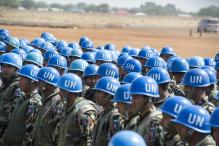As part of the ongoing Managing Exits from Armed Conflict (MEAC) initiative, the Findings Report series seeks to put evidence about conflict transitions and related programming into the hands of policymakers and practitioners in real-time. The reports detail findings from MEAC studies in Nigeria and Colombia and seeks to put evidence about conflict transitions and related programming into the hands of policymakers and practitioners in real time. The reports contain short overviews of findings (or emerging findings) across a wide range of thematic areas (e.g., climate-driven recruitment into armed groups) and include analyses on their political or practical implications for the UN, Member States, and local partners.
The fifth report is based on data collected from December 2020 to January 2021, as part of a phone survey with a representative sample of 3,483 community members and a survey conducted with over 215 community leaders (e.g., Bulamas, Lawans, ward chairmen) from November 2020 to February 2021 from key locations in and around the Maiduguri metropolitan area in Borno State, Nigeria. The report presents emerging findings about community experiences with and perceptions of Volunteer Security Outfits – and how they differ by gender. This data was gathered to understand the full range of actors involved in the insurgency and support UN partners working in the North East of Nigeria in their efforts to demobilize children from – and support efforts to professionalize – self-defence groups.
Key Findings
- Volunteer Security Outfits (VSOs) are a deeply embedded part of the conflict landscape in the North East of Nigeria, and they play an outsized role in the security architecture, contributing to the protection of local communities from Boko Haram.
- 91 per cent of community leaders surveyed in Maiduguri Metropolitan Council (MMC), Jere, and Konduga reported having a Civilian Joint Task Force (CJTF) in their community, and nearly half had non-CJTF Yan Gora group(s) as well.
- A significant proportion of community leaders report that the CJTF has harmed their communities (40 per cent), generating significant fear about whether former VSO members might cause harm in the future.
- Often the CJTF did nothing to make amends for perceived harms, but when it did, financial reparations seem to be made mostly at the community-level, while community members are more likely to report receiving apologies.
Research output:
Findings Report 5: Volunteer Security Outfits in North East Nigeria



